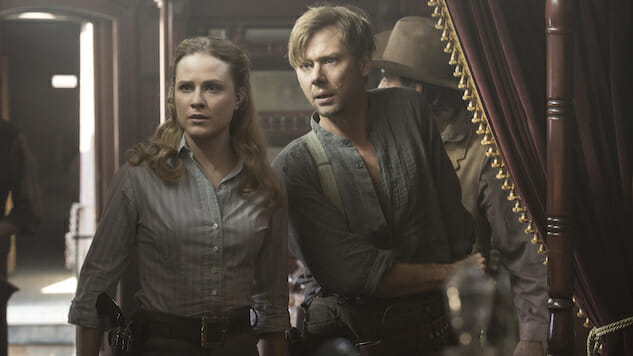Although I think this should go without saying, let me just say up front: if you have not seen this week’s episode of Westworld, stop at the end of this sentence, go watch it, and then come back and continue reading this review.
There were hints all along that Bernard (Jeffrey Wright) wasn’t human. Little digs that Ford (Anthony Hopkins) would take at him and comments made about the programming head. They were subtle; the writers did the right thing by throwing little distractions in our way, like showing him having an emotional heart-to-heart with his “wife.”
The cold truth is, Bernard is one of Ford’s creations. He’s meant simply to oversee his maker’s dominion and keep everything on track. Which throws into disarray everything that’s happened in the series thus far. Bernard’s efforts to uncover the glitch making the Hosts more self-aware? Finding out, with the help of the suddenly disappeared Elsie (Shannon Woodward), that someone is trying to sneak the intellectual property of the androids out of the park? It’s very clear now that Ford knew this was happening and let it happen to further the evolution of his androids.
If that doesn’t send a small chill down your spine, Hopkins’ performance at the end of the hour is sure to do so. His stone-faced indifference to having Bernard murder Christine (Sidse Babbett Knudsen) and his cold delivery of the line “I built all of this” are The Silence of the Lambs-level terrifying. And like the character that netted him an Oscar in 1992, I strangely found myself cheering for him to keep control of his technocratic fiefdom.
In a perfect world, HBO would cut Westworld’s first season off right here. Leave us all dangling with the image of Christine, as lifeless and bloodied as the androids they hose down at the end of the night, and wondering what’s to come until they turn the lights back on in 2017.
But I’m also incredibly excited to see what the next three weeks bring. Like you, I’m going to be spending a lot of time guessing which other Westworld employees are fake and just how much control Ford actually has over things. Is the subplot of Maeve’s self-awareness, her intention to escape with the assistance of her (possibly) human minders, part of Ford’s plan to push AI forward? And does that make the quest of The Gunslinger (Ed Harris) part of his grand scheme as well?
Mostly, I just want to know what the endgame of William (Jimmi Simpson) and Dolores (Evan Rachel Wood) is. He represents the purest ideals of Westworld. As their ad copy says, and as he echoes, this park exists to “reveal your deepest self… who you really are.” The experience of ridin’ and shootin’ and courtin’ a lovely maiden has “unlocked something” in him.
How can it be anything other than temporary before William returns to his dull, plodding existence? Just think of the many times that you’ve been on vacation and thought, “Maybe I should just stay here forever.” He’s free of responsibilities and worries that will still be waiting for him when he gets back home. More than likely, he’ll marry his frenemy, Logan’s sister, and shuffle through life dead-eyed until he can get back to Westworld again. It will be his little glimmer of hope on the horizon. Isn’t that what vacations are, for most people?
There’s also the sizeable wrinkle that he’s either willfully ignoring or being foolish about: Dolores isn’t real. The sex and romance may have been great, but it’s been programmed into her. As they’ve talked about all along, everything about the park has been engineered to give you the ultimate in satisfaction. They knew that this was just what William needed: to feel virile and wanted. He got it, and it’s going to leave him glowing by the time he rides off into the sunset that is his real life—or he’ll be haunted every day until he returns.
That’s why I’m almost willing to buy into the theory that we’re actually privy to two timelines in the series, and that William and The Gunslinger are the same man at different points in his life. In reality that is, again, the intelligence of the storytelling. They’re giving us, through many pairings, a glimpse into how a person evolves over his lifetime.
The casting of another Brit (Simon Quarterman) in the role of the rude, brutish narrative director is not coincidental. He’s supposed to represent Ford before he became megalomaniacal. The same goes for the brash, brazen Charlotte (Tessa Thompson), the board director happy to sit, legs akimbo in a short robe, across from the more buttoned up Theresa.
For William and the Gunslinger, the nature of one’s addiction is evolving, too. As I’ve talked about in previous write-ups, the latter has tired of the simple pleasures of the park and wants something more extreme. It stands to reason that the former meek pencil pusher who’s been “unlocked” by his experiences so far will be back for more, but will eventually grow tired of being wooed and excited by women and six-shooters. That’s when, perhaps, his true, most primal instincts will come raging forth.
My suspicion is that, with William, that evolution is going to be a quick one. There was a small hint of that in his big speech to Dolores about how he initially thought the park was just there to appeal to people’s baser instincts. I think he’s neglecting just how true that is, and just how much it has the potential to get a hold of him. And when it happens, it’s going to be more brutal to watch than any shooting or beating they’ve put onscreen.
Robert Ham is an arts and culture journalist based in Portland, OR. Read more of his work here and follow him on Twitter.
